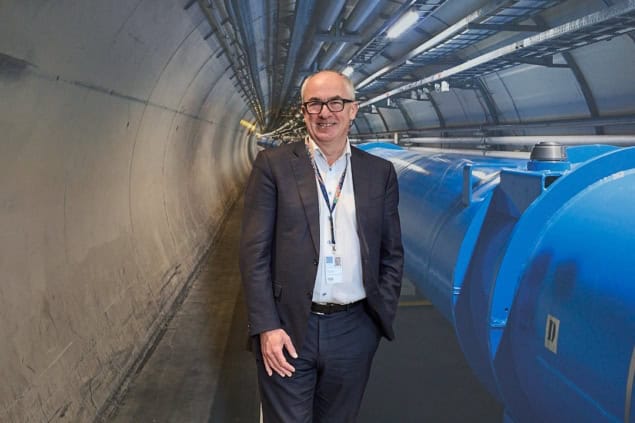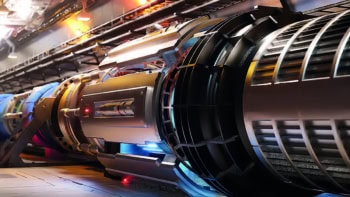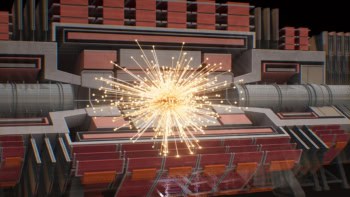
The UK particle physicist Mark Thomson has been selected as the 17th director-general of the CERN particle-physics laboratory. Thomson, 58, was chosen today at a meeting of the CERN Council. He will take up the position on 1 January 2026 for a five-year period succeeding the current CERN boss Fabiola Gianotti, who will finish her second term next year.
Three candidates were shortlisted for the job after being put forward by a search committee. Physics World understands that the Dutch theoretical physicist and former Dutch science minister Robbert Dijkgraaf was also considered for the position. The other was reported to have been Greek particle physicist Paris Sphicas.
With a PhD in physics from the University of Oxford, Thomson is currently executive chair of the Science and Technology Facilities Council (STFC), one of the main funding agencies in the UK. He spent a significant part of career at CERN working on precise measurements of the W and Z boson in the 1990s as part of the OPAL experiment at CERN’s Large Electron-Positron Collider.
In 2000 he moved back to the UK to take up a position in experimental particle physics at the University of Cambridge. He was then a member of the ATLAS collaboration at CERN’s Large Hadron Collider (LHC) and between 2015 and 2018 served as co-spokesperson for the US Deep Underground Neutrino Experiment. Since 2018 he has served as the UK delegate to CERN’s Council.
Thomson was selected for his managerial credentials in science and connection to CERN. “Thomson is a talented physicist with great managerial experience,” notes Gianotti. “I have had the opportunity to collaborate with him in several contexts over the past years and I am confident he will make an excellent director-general. I am pleased to hand over this important role to him at the end of 2025.”
“Thomson’s election is great news – he has the scientific credentials, experience, and vision to ensure that CERN’s future is just as bright as its past, and it remains at the absolute cutting edge of research,” notes Peter Kyle, UK secretary of state for science, innovation and technology.“Work that is happening at CERN right now will be critical to scientific endeavour for decades to come, and for how we tackle some of the biggest challenges facing humanity.”
‘The right person’
Dirk Ryckbosch, a particle physicist at Ghent University and a delegate for Belgium in the CERN Council, told Physics World that Thomson is a “perfect match” for CERN. “As a former employee and a current member of the council, Thomson knows the ins and outs of CERN and he has the experience needed to lead a large research organization,” adds Ryckbosch.
The last UK director-general of CERN was Chris Llewellyn Smith who held the position between 1994 and 1998. Yet Ryckbosch acknowledges that within CERN, Brexit has never clouded the relationship between the UK and EU member states. “The UK has always remained a strong and loyal partner,” he says.
Thomson will have two big tasks when he becomes CERN boss in 2026: ensuring the start of operations with the upgraded LHC, known as the High-Luminosity LHC (HL-LHC) by 2030, and securing plans for the LHC’s successor.
CERN has currently put its weight behind the Future Circular Collider (FCC), which will cost about £12bn and be four times as large as the LHC with a 91 km circumference. The FCC would first be built as an electron-positron collider with the aim of studying the Higgs boson in unprecedented detail. It could later be upgraded as a hadron collider, known as the FCC-hh. How a next-generation particle collider could unravel the mysteries of the Higgs boson
The construction of the FCC will, however, require additional funding from CERN member states. Earlier this year Germany, which is a main contributor to CERN’s annual budget, publicly objected to the FCC’s high cost. Garnering support from the FCC, if CERN selects it as its next project, will be a delicate balancing act for Thomson. “With his international network and his diplomatic skills, Mark is the right person for this,” concludes Ryckbosch.
That view is backed by particle theorist John Ellis from King’s College London, who told Physics World that Thomson has the “ideal profile for guiding CERN during the selection and initiation of its next major accelerator project”. Ellis adds that Thomson “brings to the role a strong record of research in collider physics as well as studies of electron-positron colliders and leadership in the DUNE neutrino experiment and also extensive managerial experience”.



